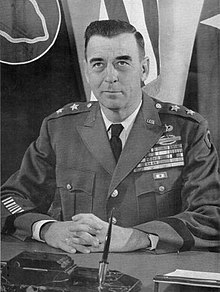Edwin Walker | |
|---|---|
 | |
| Birth name | Edwin Anderson Walker |
| Born | November 10, 1909 Kerr County, Texas, U.S. |
| Died | October 31, 1993 (aged 83) Dallas, Texas, U.S. |
| Allegiance | |
| Service | |
| Years of service | 1931–1961 |
| Rank | |
| Commands | |
| Battles / wars | World War II Korean War |
| Awards | Silver Star Legion of Merit (2) Bronze Star Medal (2) |
Edwin Anderson Walker (November 10, 1909 – October 31, 1993) was a United States Army major general who served in World War II and the Korean War. Walker resigned his commission during 1959, but Eisenhower refused to accept his resignation and gave Walker a new command of the 24th Infantry Division in Augsburg, Germany. Walker again resigned his commission in 1961 after being publicly and formally admonished by the Joint Chiefs of Staff for allegedly referring to Eleanor Roosevelt and Harry S. Truman as "pink" in print and for violating the Hatch Act of 1939 by attempting to influence the votes of his troops. President John F. Kennedy accepted his resignation, making Walker the only US general to resign during the 20th century.
In early 1962, Walker campaigned to become governor of Texas and lost the Democratic primary election to the eventual winner, John Connally. In October 1962, Walker was arrested for promoting riots at the University of Mississippi in protest against the admission of black student James Meredith into the all-white university. Attorney General Robert F. Kennedy ordered Walker committed to a mental asylum for a 90-day evaluation, but the ACLU and psychiatrist Thomas Szasz protested along with rightist groups, and Walker was released in five days. Attorney Robert Morris in early 1963 convinced a Mississippi grand jury to not charge Walker with a crime.
Walker reported that he was the target of an assassination attempt at his home on April 10, 1963, but escaped serious injury when a bullet fired from outside hit a window frame and fragmented. After its investigation into the assassination of John F. Kennedy, the Warren Commission concluded that Walker's assailant had been Lee Harvey Oswald.[1]
- ^ "Chapter 4: The Assassin". Report of the President's Commission on the Assassination of President John F. Kennedy. Washington, D.C.: United States Government Printing Office. 1964. pp. 183–187.